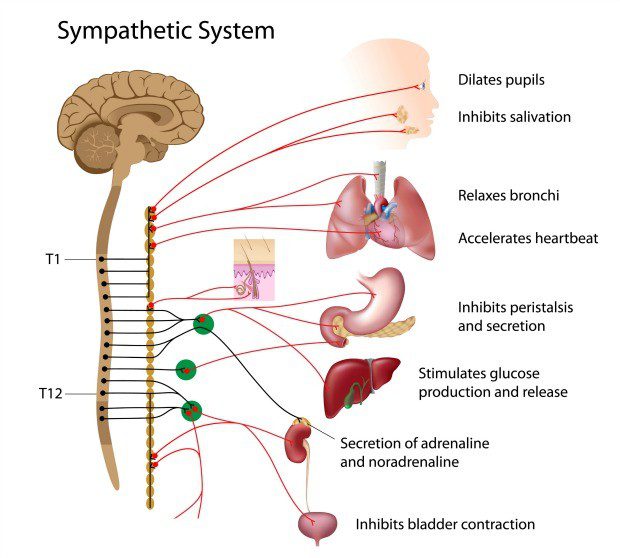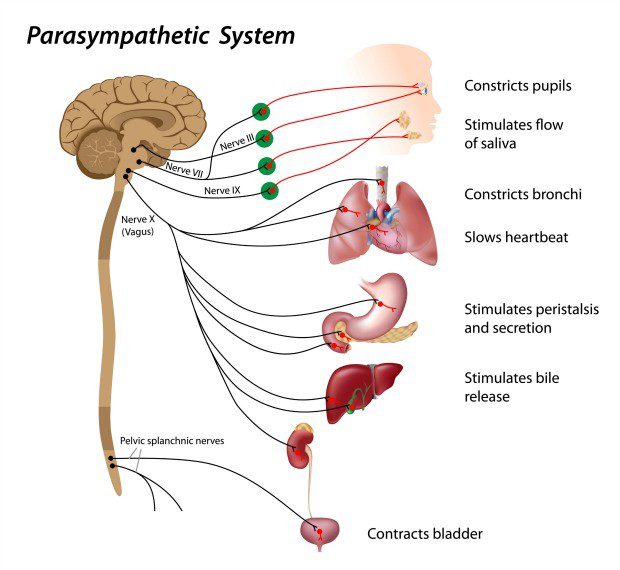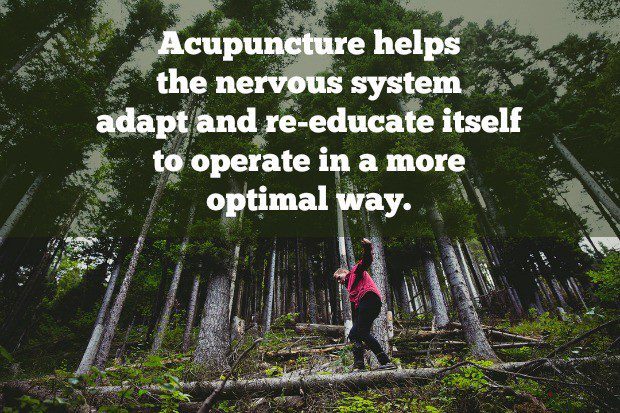Stress, along with anxiety and depression, is one of the most common issues that patients come in for at our Washington DC acupuncture clinic. Their chronic stress manifests as a wide range of emotional, physical, cognitive and behavioral symptoms.
In many cases, they’re able to find relief through acupuncture treatment, reporting:
- More stable mood, calmness and centeredness
- Happier, more consistent sense of ease
- Better self-esteem
- Feeling more in control & able to perform work
- Usual anxiety triggers no longer affect them
- Higher / more stable energy
- Ease of digestion
- Free of aches & pains
- Better circulation
- Higher adaptability & ability to solve problems
- More ease integrating learning experiences
- Improved libido
- Higher focus
- Clearer thinking & decision-making
- Better ability to take on work and tasks
- Appetite regulation
How to explain the above results? While Traditional Chinese Medicine has its unique framework for explaining them, here we will discuss acupuncture and mental/emotional health from a physiological perspective. The key seems to be that acupuncture acts like physical therapy for the nervous system. It entrains the nervous system and brain to behave in ways that correspond to desired effects. Like those described above.
More specifically, studies show that acupuncture appears to have a positive effect on Heart Rate Variability, which in turn promotes a healthy Central Autonomic Network or the brain’s “executive function.” In this article, we will explore:
- what Heart Rate Variability and the Central Autonomic Network are,
- how acupuncture keeps these body systems in balance
- how keeping them in balance prevents and diminishes all manner of stress-related symptoms.
Stress at the root of mental, emotional and physical symptoms
First of all, it’s helpful to understand how central stress is to our health. Chinese medicine, as well as many traditional medical systems that see the mind and body as inextricably interconnected, see thoughts and emotions as the primary drivers of physical health issues.
This acknowledgment of the mind-body connection is becoming increasingly mainstream. For example, WebMD’s list of stress symptoms span the emotional, physical, cognitive, and behavioral realms. Scanning its list, it’s easy to see how the mind, emotions, body, and behaviors are intimately interconnected:
Emotional symptoms of stress include:
- Becoming easily frustrated, agitated, and moody
- Feeling overwhelmed, like you are losing control or need to take control
- Having trouble relaxing and quieting your mind
- Feeling badly about yourself (low self-esteem), lonely, worthless, and depressed
- Avoiding others / social situations
Physical symptoms of stress include:
- Low energy
- Headaches
- Upset stomach, including diarrhea, constipation, and nausea
- Aches, pains, and tense muscles
- Chest pain and rapid heartbeat
- Insomnia
- Frequent colds and infections
- Loss of sexual desire and/or ability
- Nervousness and shaking
- Cold or sweaty hands and feet
- Clenched jaw and grinding teeth
- Tinnitus (ringing in the ear)
Cognitive symptoms of stress include:
- Constant worrying
- Racing thoughts
- Forgetfulness and disorganization
- Inability to focus
- Poor judgment
- Being pessimistic or seeing only the negative side
Behavioral symptoms of stress include:
- Changes in appetite — either not eating or eating too much
- Procrastinating and avoiding responsibilities
- Increased use of alcohol, drugs, or cigarettes
- Exhibiting more nervous behaviors, such as nail biting, fidgeting, and pacing
Read Stress Symptoms on WebMD.
What are the consequences of long-term chronic stress?
A little stress every now and then is part of life and not something to be concerned about. Ongoing, chronic stress, however, can cause or exacerbate many serious health problems, including:
- Mental health problems, such as depression, anxiety, and personality disorders
- Cardiovascular disease, including heart disease, high blood pressure, abnormal heart rhythms, heart attacks, and stroke
- Obesity and other eating disorders
- Menstrual problems
- Sexual dysfunction, such as impotence and premature ejaculation in men and loss of sexual desire in both men and women
- Skin and hair problems, such as acne, psoriasis, and eczema, and permanent hair loss
- Gastrointestinal problems, such as GERD, gastritis, ulcerative colitis, and irritable colon
Although this may seem like a list or random symptoms, there is something that links them all together—the central nervous system. Acupuncture is a powerful and safe way to create beneficial changes in central nervous system function. That is why such a large majority of patients at our clinic experience stress relief after each and every treatment.
To understand this further, let’s look at the two main divisions of the Autonomic Nervous System, which controls the bodily functions that are not consciously directed—like breathing, digestion and heartbeat. These two main divisions are the Sympathetic Nervous System (SNS) and the Parasympathetic Nervous System (PNS).
Fight-or-flight: the Sympathetic Nervous System
When we experience stress, it triggers our Sympathetic Nervous System (SNS). Usually known as the “fight-or-flight” response, the SNS is responsible for getting the body and mind ready for confrontation.
This is what it looks on the outside, Monty Python style:

This is what it looks like on the inside:

And of course, this is how you’d want your body to respond in an emergency—it’s a reasonable response to a threat.
The problem with too many problems (SNS overload)
The problem comes when we are chronically locked into a fight-or-flight response, due to our perception of ongoing threats. In the average life of many modern urban students and professionals like most of the clients that come to our clinic, almost all of these threats are mental and emotional in nature—not threats of actual physical harm. When stress becomes chronic, our digestive, respiratory, cardiovascular, reproductive, and hormonal systems, as well as our brain, start to take a beating.
This kind of chronic stress starts to lead to the extensive list of stress-related symptoms mentioned above. Not so great.
Rest-and-digest—the Parasympathetic Nervous System
Many of our patients with chronic digestive issues report that they diminish substantially when they’re on vacation. That’s no doubt due to the part of the body that balances out the fight-or-flight response. The Parasympathetic Nervous System (PNS) called “rest-and-digest,” the PNS gets you ready for relaxation, digestion, and general feelings of calm and well-being.
What it looks like on the outside:

What’s happening on the inside:

Heart Rate Variability—why you want it in optimal ranges
So, how do you know when you are in fight-or-flight mode (sympathetic), or rest-and-digest mode (parasympathetic)? Aside from your own subjective feelings of either stress or relaxation, there is an objective measure—heart rate variability.
Heart rate variability, or HRV, is the measurement of how the heart rate varies in timing between heartbeats. Scientists have found that HRV reflects the level of activity in the vagus nerve. The vagus nerve (see pictures above) is one of the primary players in the body’s central nervous system. The “tone,” or activity level, in the vagus nerve is an indicator of when you’re spending more time in sympathetic or parasympathetic mode.
Impact of chronic stress on HRV
Over the years, doctors and psychologists have correlated low HRV with higher incidences of heart disease, high blood pressure, stress, anxiety, and depression.
Decreased HRV is associated with states of stress, tension, anger, frustration, anxiety, and depression. Research psychologists found that subjects focusing on thoughts of anger and frustration reduces HRV, while emotions of appreciation increased HRV. According to these studies, if you spend time being angry or frustrated, your heart behaves like the heart of someone who is four times more likely to die of a heart attack.
Conversely, healthy HRV ranges are associated with: even emotions, reduced stress, better adaptation to stress situations, better performance, better functioning in day-to-day life.
The Central Autonomic Network—the key to “Being in the Present Moment”
When HRV gets into optimal ranges, this creates a positive influence in the Central Autonomic Network (CAN), which is very desirable indeed. CAN refers to the parts of the brain that create our “executive function,” consisting of:
- Working memory—store details of our current surroundings and events to integrate the changes that are happening around us.
- Gathering and organizing information from the mind and body (signals from vagus nerve, heart, lungs, emotional centers) to negotiate and respond to present moment experience.
As described in The Wild Medicine Solution, by Guido Mase:
“Between these 2 functions, the CAN (and its associated emotional-processing centers in the limbic system) literally acts as a bridge between mind and body… It seems to be a major, central structure involved in keeping us on top of day-to-day changes, especially unexpected sources of stress. As such, it is crucial to successful performance in response to a wide range of social and cultural demands.” (p.54)

Thus, a healthy CAN is key to navigating a stressful life while keeping our body in a non-stressed state of being. CAN inhibits our flight/fight response (SNS) and promotes greater amounts of time spent in the rest-and-digest response (PNS).
Therefore, when our CAN is active, and HRV is high, executive function increases, and we are:
- better adapted to our circumstances
- more effective and accurate in our decision making
- more focused
- happier and less stressed about everything we are doing
- less prone to heart disease, heart attacks, stress, anxiety, and depression
Therefore CAN is crucially important for getting and keeping us in the flow of events, feeling less anxious, stressed, frazzled.
Acupuncture—creating balance in the nervous system
Simply put, acupuncture helps get HRV into optimal ranges, which also keeps our Central Autonomic Network healthy. A 2012 meta-analysis of studies on acupuncture and HRV found that acupuncture does indeed improve patients’ HRV scores. This helped patients improve their symptoms, which in these studies were heart disease, hypertension, mild anxiety and depression, insomnia, migraines, and muscle pain.
One of the key points that the authors emphasized was the “dosage” of acupuncture was important in helping patients get results, both in number of points per session, and frequency and duration of the treatment plan. In studies where patients received only 1-3 points per treatment, or got treatment only once every 2-4 weeks, results were decreased. In studies where patients received more points, and treatments at least weekly, results increased.

In our experience, this is also true. Acupuncture is like a physical therapy for the nervous system. With sufficient numbers of treatments and points per session, acupuncture helps the nervous system adapt and re-educate itself to operate in a more optimal way.
A more balanced individual—our goal for our patients at our clinic
When our nervous systems are in balance, we thrive. As we’ve seen out our clinic over the course of thousands of treatment sessions, many clients find greater balance after getting acupuncture. It’s always been amazing to us, and our patients, how wide of a variety of effects acupuncture can have on our well-being.
The science discussed above paints a good picture of why we can see such improvement in so many of the mental, emotional, relational, and behavioral areas of people’s lives. It paints a picture of why also we find such high levels of success in helping people with stress-related physical issues, such as headaches, muscle pain, digestive problems, respiratory issues—all areas connected by the vagus nerve, and badly affected when the SNS and PNS, CAN, and HRV levels are thrown off by stress.

Finally, we believe strongly in helping people find a long term strategy for stress-reduction. To really get a handle on stress in your life, you’ll start with an initial series of acupuncture sessions, usually about 5 sessions over 2 weeks. Treatment plans are then customized for each individual. In many cases, a series of treatments over 3 months is the optimal starting point.
Custom Herbal Medicine
Herbal medicine is an additional powerful method for balancing the nervous system, as well as providing “adaptogenic” effects which help cushion against stressful time periods. In a consultation, our herbalists will discuss your current mental and physical symptoms, and create custom herbal formulas specific to your situation. Over time, herbs can play a strong role in keeping us balanced, focused, and energized, and protected from the inevitable fluctuations of stress.

What should I do if I have stress-related conditions?
If you are interested in learning more about how we can help you with stress-related health issues, feel free to schedule an appointment online or call us at (202) 297-7404. Get your questions answered by one of our practitioners and find out if we’d be a good fit for you.








